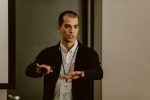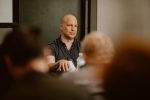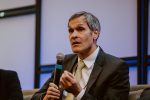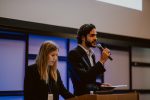
Recently, Blockchain at UCLA partnered with law firm BakerHostetler and accounting firm Ernst & Young for the Genesis Blockchain Summit. The sold-out event featured experts debating the benefits and challenges of blockchain use in business, law and academia and offered a deep dive on the nascent technology.
Topics including cybersecurity, data privacy, smart contracts and potential regulatory issues were deliberated in various panels and presentations at the day-long event with a rapt audience at each session.
Blockchain is a form of distributed ledger technology that stores blocks of information, with each block in the chain representing a transaction. The transactions can be financial in nature or anything of value. Blockchain is not controlled by any single entity, meaning it does not have a central administrator or centralized data storage, and is theoretically incorruptible since it has no single point of failure.
Furthermore, the information held on a blockchain exists as a shared and continually reconciled database that is public, accessible and easily verifiable. Since the chain self-regulates and cannot be corrupted, it serves as a stable network for multiple uses.
Blockchain at UCLA is one of the largest student-run blockchain groups in the country. It includes not only UCLA Samueli students and faculty, but also those from the UCLA law and business schools to offer both a technical and enterprise perspective.
Anthony Humay, third-year computer science student and co-founder of the organization, stated that the group is strategically interdisciplinary since its members believe blockchain has the potential to impact many areas of society.
“Blockchain is the backbone of a potential revolution that could affect every industry and country, and we want our membership to reflect that,” Humay said. “If you have any interest at all in the technology we want to meet you.”
Electrical engineering professor John Villasenor, who will be teaching a course in blockchain and who also holds appointments at UCLA’s Anderson School of Management and Luskin School of Public Affairs, commented, “It’s important to keep in mind how hard it is to predict the longer term applications of a technology. For example, smart contracts will probably end up being used in ways that are hard to envision today.”
At its core, Blockchain at UCLA’s mission is education. Part of that goal is met by engaging with the Los Angeles community on the potential uses of the technology, and also educating its own members through an instruction series, complete with a syllabus and student-led courses.
To that end, the Genesis Summit successfully brought industry thought leaders and UCLA students together to spark ideas and new perspectives about the technology.


















